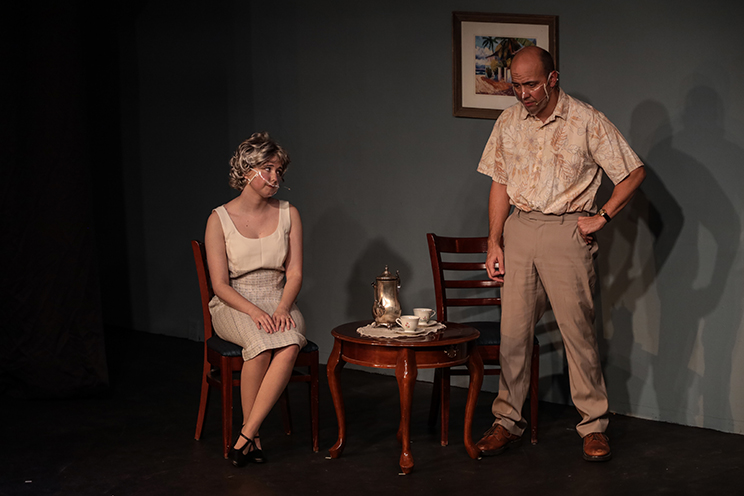Writer Shannon Severson
[dropcap]T[/dropcap]he bright lights of Broadway may be thousands of miles away, but Arizona has some shining examples of theatrical talent all its own. The challenge is finding and highlighting their work in a way that can reach a broad audience here and across the country. Starlight Community Theater’s annual playwriting contest brings the voices of the Grand Canyon State into the spotlight.
The theater this spring announced Eric Bond as the winner of its 2020 competition for his submission of “The Present Tense,” a family drama with a sci-fi twist. It’s the tale of Captain Belle Crozier — an astronaut, wife and mother who is torn between her love of family and her passion for exploring outer space.
Bond chose his female protagonist as an homage to the many strong women who surrounded him as he grew up. Her journey — both physical and emotional — is humorous and poignant. It doesn’t take a degree in rocket science to relate to the touchstones of career, relationships and the drive to achieve.
Bond’s play will receive a virtual production June 11 and 12 and, along with other winning scripts, will be considered for a full production in future seasons.
“I felt ecstatic about winning,” Bond says. “I won’t lie and say I wasn’t checking my email every day. It’s the first professional playwriting contest I’ve won and the first [play] I’ve written that will be staged.”
Every Possible Iteration
Bond has been an actor since his high school days and first started writing plays at age 16. Coming from a family of writers, his love for words and his naturally quirky sense of humor translated nicely from stage to page.
“My first musical was during my freshman year at Centennial High School,” says Bond, laughing as he recalls the experience. “I had the distinguished role of ‘Knight No. 2’ in the musical ‘Once Upon A Mattress.’ I later decided, ‘I’m going to write a play because I’m funny and I need the approval of people.”
The first two plays he wrote were a family Christmas play read-through — which, he explains, means he made his family read it at Christmastime — and a show he wrote with friends from his improvisational theater club.
“It was very bad,” he muses, “but I thought it was great at the time. It wasn’t until I showed it to one of my community college professors that I was broken of that assumption.”
What drew him to playwriting was the dialog. Short stories require a lot more filler that doesn’t thrill Bond’s creative bent. He’s always got several ideas going in a series of notebooks and says his work definitely skews to the darkly comedic.
“I just really like language,” he says. “I think it’s because when I was a kid I had tubes in my ears, so from roughly ages 2–4 I have no memory of sound at all. Once I knew I wanted to write plays, I took a break from writing so I could read more plays. I took classes, performed more and got a feel for everything. It was the greatest help to be immersed in different styles and I really challenge myself.”
When Bond writes plays now, he carefully weighs how a theater company will consider his work — paying close attention to the demands of staging, lighting and the size of the cast. His experience as an actor has made him sensitive to scene transitions and what makes them a bit easier on the performers. As far-out as his original ideas may go, he reins in what he can for practical purposes.
“It’s a positive tension between how much you want to write what’s in your mind and balancing that with time, production and stage management,” Bond says. “With the pandemic still going strong during the time I was writing, I decided to keep ‘The Present Tense’ pretty sparse, with few actors on stage at a time and considered how it might work in a virtual production.”
Bond jokes that he was probably terribly annoying to his fiancé, Grace, as he obsessed over the play’s second act on their nightly walks. He wanted it to contrast with the first act’s ambiguity of what might be going through Belle’s head versus her outward behavior.
“I went through every possible iteration,” Bond recalls. “I didn’t want to make the characters too unsympathetic and, being wintertime with the seasonal depression, you can get very dark. From childhood, I’ve had a sense of existential dread and now I get to put that on other people.
“I’m a big fan of science fiction… ‘Star Trek’ is like a comfort food I come back to. What I really love about it is being able to ask big questions that you just can’t address in a kitchen sink play… though there is a lot of this play that does take place in the kitchen.”
Dream on Paper
Bond’s work to weave an engaging story with the requirements and constraints of a small community theater hit just the right marks for the team of judges at Starlight Community Theater.
The theater’s artistic director Dan Ashlock, Jr. chairs the anonymous committee of five readers who pour over submissions without knowing the identity of the playwrights. He says the competition began in 2018 in response to inquiries from writers across the country who would submit new plays for Starlight Community Theater to produce on their stage in exchange for waiving royalty fees.
“We were brainstorming in a board meeting and said, ‘We should really see if we can encourage Arizonans to do this and get some homegrown stuff,” Ashlock says. “We only take submissions of plays, not musicals. We are trying to encourage young and new playwrights whose work hasn’t been produced. We want people to have the chance to get that dream on paper.”
The plays are judged using several criteria, including being suitable for most ages, stageability, believable characters, story originality, overall concept and the potential to go on to be produced in other venues.
“This year, the committee sent me the scores and two plays were virtually tied,” Ashlock explains. “For the first time, we decided to name a winner and a runner-up.”
Matthew Eads’ “Simply, I Love You” earned the runner-up title for its story about a personal journey of love, passion, heartbreak and friendship. Two young men find each other at what seems to be the perfect moment in time. But because perfection is impossible, there are trials and tribulations as they discover their relationship may not end up how they expected.
“This is the second full-length show I have written that will be staged by Starlight Community Theater and I feel so blessed,” Eads says.
Ashlock adds that Eads’ play will also get a virtual production. Previous winners “The Lost Girl” (2018) and “Holy Matrimony” (2019) received a staged reading and full production, respectively. The artistic director works to get the plays into the hands of directors and decides where they might fit into the theater’s production calendar.
With the current winner and runner-up for 2020 chosen, Ashlock is already gearing up to begin receiving submissions for the 2021 contest. Details will soon be made available via the theater’s website with an anticipated deadline around Halloween.
Through its playwriting contest, Starlight Community Theater continues to pave the way for audiences to get a first look at the work of talented new playwrights from right here in Arizona.
“The Present Tense”
June 11 and 12 | See website for times | $10+ | starlightcommunitytheater.com







Comments by Admin